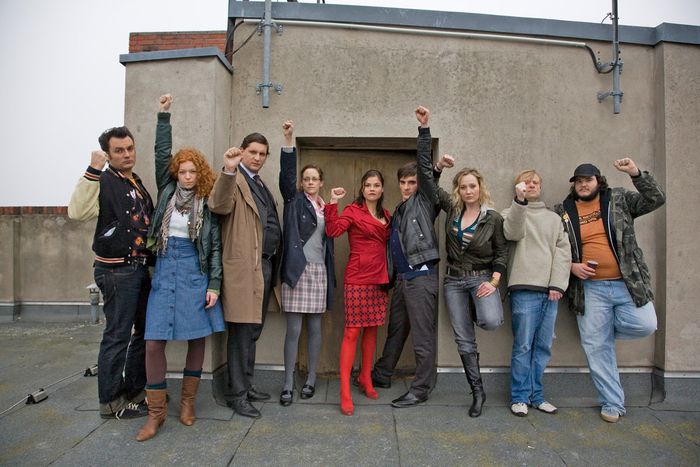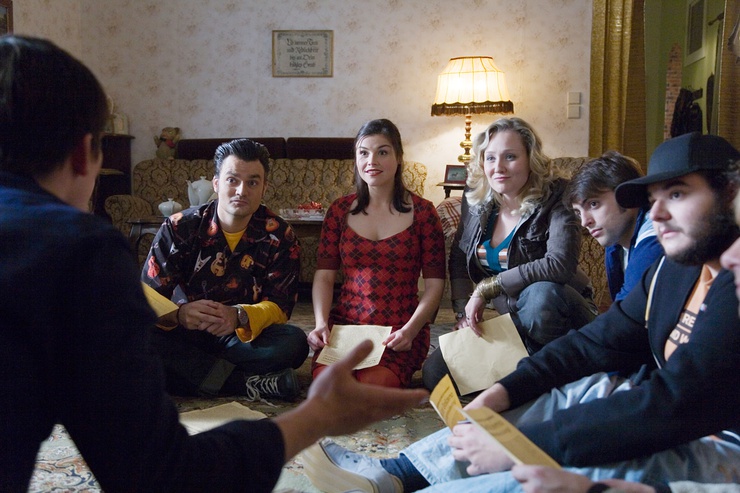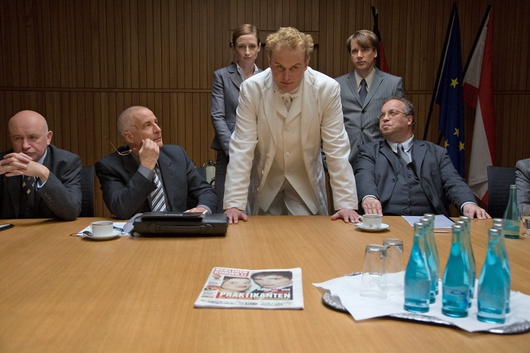
Film review Germany: interns feature in 'Résiste - Aufstand der Praktikanten'
Published on
Translation by:
Annie Rutherford'A Quantum Revolution' has been screening in German cinemas since 12 November
 Film-Till's life (Hannes Wegener) is like that of countless of his real-life fellow sufferers: he is stuck in the spiral of internships. He has already completed eight different internships - each one in the hope of the much longed for permanent job. When boss number nine finally coldly brushes him off as well, he seeks revenge - and, along with two fellow interns (Fanny Staffa, Steffen Jürgens), he founds his own agency - 'Pakt', the first intern advice bureau. Admittedly not out of charitable motives, but rather in order to rake in some proper money for himself.
Film-Till's life (Hannes Wegener) is like that of countless of his real-life fellow sufferers: he is stuck in the spiral of internships. He has already completed eight different internships - each one in the hope of the much longed for permanent job. When boss number nine finally coldly brushes him off as well, he seeks revenge - and, along with two fellow interns (Fanny Staffa, Steffen Jürgens), he founds his own agency - 'Pakt', the first intern advice bureau. Admittedly not out of charitable motives, but rather in order to rake in some proper money for himself.
Meanwhile his childhood sweetheart, the half-French Sydelia (Katharina Wackernagel), idealistic and always ready for battle, arrives in Berlin. But the permanent job with a 'serious left-wing magazine' (clear allusions to 'Spiegel' are of course purely coincidental) turns out to be a concealed - and sure enough unpaid - internship. But this won't do for Sydelia, who changes all her plans and from then on has her mind made up to instigate her own small revolution - for the fair treatment of generation internship.
Of course it's not long before Till's and Sydelia's paths cross, in true film fashion. And this seriously roughs up the situation - and Till's feelings. As the interns' first general strike gets closer, Till has to decide - between his business and his newly awakened sense of idealism. In the last few years a new sub-genre of German films has established itself: the revolutionary flick - in a somewhat romantic transfiguration, young German filmmakers try to save a little of the rebellious old spirit of '68 and bring it into the present day.

Die fetten Jahre sind vorbei ('The Edukators', 2003 ) for instance or Free Rainer (2007), a satire with Moritz Bleibtreu as an ex-TV producer who is able by manipulating ratings somewhat to reclaim art and culture for the former land of poets and thinkers. Admittedly these films are close to reality in only the rarest of cases. But one thing is always left behind if the filmmakers have done their job properly: a small, newly ignited spark of anarchy in the heart. The odd urge to step out on to the balcony as Philipp Scheidemann once did and simply to call out for democracy or whatever. Or at least to spray 'Fuck the system' on a wall.
After a nice intro the director very quickly loses sight of his real aim of a biting satire on the world of internships in favour of a contrived love story
Yet as much as I wanted it, as much as the theme of the exploitation of interns touches me personally, this feeling just didn't want to materialise this time round. Because unfortunately after a nice introduction director Jonas Grosch very quickly loses sight of his real aim of a biting satire on the genuinely crazy world of the circus of internships in favour of a very much contrived love story. So we're left with just a few attacks which are only very briefly touched on and are mainly known from the trailers anyway. And yet there would have been chances all the way through to move out of the shadows of its overpowering forerunners. When the German government denies the interns the right to strike in the film, it at first seems as though the uprising really was just a storm in a tea cup, as if the interns' will to strike will break down because of their own fear of breaking the law and desire for a job.
What if the general strike in the film really had to be broken off because no one had come? What if Grosch's painful message were that in the end every single intern only cares about his or her own professional well-being? Maybe such a depressing ending would even have offered a more sincere picture of our society. Certainly it would have been an ending which we would have remembered more strongly than the placatory and sugar coated ending which Grosch eventually chose.
 And so the final scene remains symptomatic of the whole film and of generation internship in general: the chancellor quickly sends a text, then – cut – three months later suddenly everyone's happy again: the interns sit peacefully, their interim feud forgotten, with Till's former boss and the Man in White – the filmic symbol of the predator of capitalism – gathered in the mouldy living room of Till's generation '68 parents and celebrate their victory: the establishment of an official government ministry for interns! Exactly, the film ends not with the abolition of the slavery of interns itself, but rather its bridled and bureaucratised continuation. The question has to be asked here: how revolutionary is that meant to be then please? But as honest critics we also have to be fair. In the end Jonas Grosch's Résiste isn't a highly financed mammoth production but rather the final work of a film student – and despite all that lack the drama lacks one thing is true: the heart in any case is in the right, sorry left(-wing), place.
And so the final scene remains symptomatic of the whole film and of generation internship in general: the chancellor quickly sends a text, then – cut – three months later suddenly everyone's happy again: the interns sit peacefully, their interim feud forgotten, with Till's former boss and the Man in White – the filmic symbol of the predator of capitalism – gathered in the mouldy living room of Till's generation '68 parents and celebrate their victory: the establishment of an official government ministry for interns! Exactly, the film ends not with the abolition of the slavery of interns itself, but rather its bridled and bureaucratised continuation. The question has to be asked here: how revolutionary is that meant to be then please? But as honest critics we also have to be fair. In the end Jonas Grosch's Résiste isn't a highly financed mammoth production but rather the final work of a film student – and despite all that lack the drama lacks one thing is true: the heart in any case is in the right, sorry left(-wing), place.
For nitpickers: Katharina Wackernagel, who plays Sydelia in the film, is the older sister of director Jonas Grosch. Both are niece and nephew of Christof and Sabine Wackernagel, who embody Till's generation '68 parents. Certainly quite realistically, for the actor and writer Christof Wackernagel was affiliated to the red army faction in the 1970s and was in prison until 1987
Translated from Generationenkino im Weichspüler: 'Résiste - Aufstand der Praktikanten'



